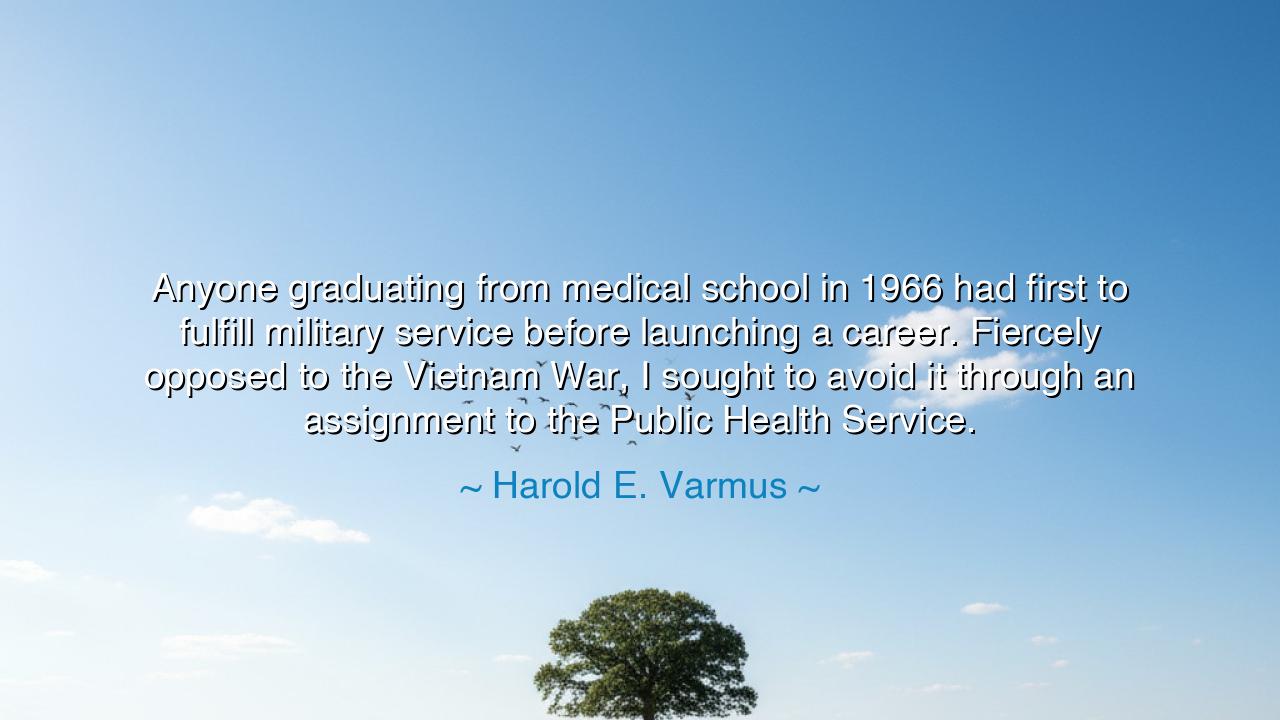
Anyone graduating from medical school in 1966 had first to
Anyone graduating from medical school in 1966 had first to fulfill military service before launching a career. Fiercely opposed to the Vietnam War, I sought to avoid it through an assignment to the Public Health Service.






The Voice of Conscience and Choice
Hear now the words of Harold E. Varmus, healer, scientist, and man of conscience, who said: “Anyone graduating from medical school in 1966 had first to fulfill military service before launching a career. Fiercely opposed to the Vietnam War, I sought to avoid it through an assignment to the Public Health Service.” Though these words may seem simple, they are heavy with moral courage, inner conflict, and the eternal struggle between duty and conviction. For in every age, the heart of the wise must choose between the command of power and the whisper of conscience.
The Meaning of the Teaching
Varmus speaks not merely of a career decision but of a moral stand — a moment when one’s integrity is tested by the tides of history. To oppose the Vietnam War in his time was to stand against the roaring current of nationalism, to question what many called duty, and to seek another path — one that healed instead of harmed. His choice to serve in the Public Health Service rather than the battlefield was not an escape from responsibility, but a transformation of duty into compassion. He teaches that true service to one’s nation is not blind obedience, but the courage to serve humanity through conscience.
The Origin of the Words
These words were born from the heart of a man who would one day become a Nobel laureate, celebrated for his discoveries in the field of cancer genetics. Yet before fame and honors, Harold Varmus was a young doctor in a world torn by war. The year was 1966, a time of turmoil and protest, when the youth of the world cried out for peace and understanding. Many were drafted into war; few found a way to serve life instead of death. Varmus, guided by his convictions, chose the path of healing over harm, and thus began a life dedicated not to conquest, but to the defense of life through science.
The Tale of Albert Schweitzer
Let us recall the story of Albert Schweitzer, the great physician and philosopher of an earlier century, who too faced the call of war. When Europe was engulfed in flames, Schweitzer turned away from the politics of destruction and went to Africa to heal the sick. He said that “reverence for life” was the truest calling of humanity. Like Varmus, he believed that to serve peace was greater than to win wars. Though both men lived in different centuries, their souls were cut from the same cloth — bound by conscience, strengthened by conviction, and guided by compassion.
The Courage to Defy Convention
It is not easy to oppose the tide of one’s generation. When the drums of war beat loudly, and nations call upon their sons and daughters to fight, the one who refuses must endure accusation and scorn. But Varmus reminds us that courage is not always loud — sometimes it is the quiet act of choosing another way. To say, “I will heal, not kill,” requires a strength rarer than battle valor. For while the sword may win glory, the healer’s hand preserves the world. The ancient sages knew this truth well: the mightiest warrior is not the one who conquers others, but the one who conquers his own fear and doubt.
The Harmony of Duty and Conscience
There is wisdom in understanding that service and conscience need not be enemies. The Public Health Service to which Varmus turned was itself a form of defense — not of borders, but of bodies; not of land, but of lives. It stood as a reminder that every age offers two kinds of service: one that destroys, and one that heals. The wise must discern between them. In every field, in every profession, there comes a time when one must decide what kind of service one will render — service to power, or service to principle.
The Lesson for All Generations
From Varmus’s choice flows a lesson that transcends his time: Follow your conscience, even when it leads away from comfort or conformity. The world honors those who obey, but it remembers those who act from moral strength. To stand for peace when others clamor for conflict, to choose knowledge when others demand violence, is the mark of the enlightened soul. Each of us, whether healer, builder, or teacher, must one day face our own Vietnam — a test of integrity that asks: Will you follow the crowd, or will you follow what is right?
The Call to the Wise and the Brave
So, O listener of future ages, remember this truth: conscience is the compass of the soul. Let it guide your steps, even when the path seems lonely. Question authority, but not out of rebellion — out of reverence for truth. Choose to serve life, not destruction. For every act of healing, every moment of compassion, strengthens the unseen foundations of peace. As Harold E. Varmus showed, the truest victory is not in battlefields of blood, but in the quiet triumph of principle over fear.






AAdministratorAdministrator
Welcome, honored guests. Please leave a comment, we will respond soon